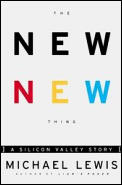After reading Moneyball and Liar's Poker, I decided I should buy everything Michael Lewis has written, so I grabbed a copy of The New New Thing when I saw it on sale. But since then it's sat on my shelf for a while, eyed with some trepidation. This is a book about Silicon Valley and the dot.com boom, written by a journalist who's not in the IT industry. That's usually a recipe for disaster. Worse, it's a book about the dot.com boom that was published in 2000, which is sort of like writing a history of the psychology of airline hijackings in 2000. The topic changed rather dramatically a year later. And with the dot.com boom in specific, coverage written at the height of that irrational euphoria is often embarassing when read with hindsight.
But after finishing Under Heaven, I knew I couldn't read anything else fictional immediately, and I had fond recent memories of Panic. So I gave Lewis a chance. In so doing, I learned three things.
First, James Clark is a fascinating person surrounded by high-stakes interpersonal politics that border on the unbelievable. I'd somehow managed to miss most of this despite having worked for SGI in 1995 and eating daily at the James H. Clark Center (a building for cross-disciplinary biology research at Stanford University funded by Clark, who used to be a Stanford professor). Lewis spends as much time here talking about Clark's personal interests, particularly his automated sailboat, as about dot.com companies, and it's surprisingly interesting.
Second, Lewis is a lot savvier than most writers about the nature of economic booms. He didn't anticipate the dot.com crash exactly, but he still mostly avoids the too-prevelant assumptions in 2000 that the world of startups had permanently changed. It helps that Clark's story was significantly affected by the sudden demise of Long-Term Capital Management and the corresponding market crash, which brings a somber note of reality to the money party. Lewis has enough sense to recognize an unreal, once-in-a-lifetime market when he sees one, even when he's in the middle of it.
Third, I should buy everything that Michael Lewis has written. Because what he's exceptionally good at, regardless of the base subject matter, is telling stories. He approaches topics by finding someone in the center of the topic to tell a story about, he has a very good eye for which people to pick, and the stories he tells are as compelling as good fiction. It might lose a bit in journalistic rigor, but this technique makes up for that in engrossing entertainment and a clearly conveyed feel for how Lewis sees his topic. It's not an objective view; it's an openly subjective view but an honest one, written by someone who's good at being the curious outsider.
This book is much, much better than it has any right to be, given when it was written and the reality-distorting field that Clark was in the middle of. It becomes obvious during the book that Clark essentially let Lewis live in his back pocket while writing, and that shows in how much Lewis was able to climb into his head. I have mixed feelings about the broader applicability of The New New Thing to the entire Silicon Valley startup culture, but as a partial biography of Clark, it's an excellent piece of work. The clincher is the startling epilogue, which one should absolutely not read out of order and which turns the whole book upside-down in a fascinating way.
The New New Thing is not completely free of the flaws that I was afraid would be there. It's always a risk to read a book about a topic area one knows well and personally because every partial understanding or perceived exoticism tends to become infuriating. From time to time, Lewis indulges in the too-familiar, and painfully stupid, stereotyping of programmers, or attempts to explain the personality of people who write code as if they're all exotic space aliens or borderline autistics. (I've read a fair bit about actual autism spectrum disorders, and um, no.) But thankfully most of those interludes are short, some of them somehow manage to be funny despite being too superficial, and most importantly, Lewis makes up for it when writing about his actual subject. He may fall back on cliches occasionally when describing people who worked for Clark, but his description of Clark's competitiveness and constant drive to fix bits of reality that he sees as wrong is nuanced, closely observed and defended, and very recognizable.
This is a surprising book on multiple fronts. It's a remarkably revealing (and not completely flattering) look at someone who's not only still alive but who actively cooperated with the writing of it. I'm impressed by Clark's courage; I would not be willing to have a book this personal written about me. It's much better than anything else I've seen written on the same topic at the same time. And it's much less about technology and much more about the politics of business and money, which is a perceptive decision on Lewis's part. His perspective on Clark is grounded in his own area of expertise.
I wouldn't look here for an explanation of what Silicon Valley was like; I think no one story can capture that, and something like Founders at Work is the best you're going to get. But I think The New New Thing is still worth reading as straight biography. It doesn't need broader social relevance to be a great story. And Lewis remains one of the best non-fiction storytellers I've read.
Reviewed: 2010-11-27
